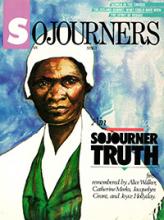The blaze of a fire threw shadows across the walls of the damp cellar. The pine logs crackled and sputtered, and from time to time Baumfree, tall and gaunt, rose and poked at them. The night was filled with stories, as Baumfree and his wife, Mau Mau Bett, recounted to their two young children the events they had witnessed. Mau Mau, a mother who had seen 10 of her children sold from her, wept as she told how Michel and Nancy had been taken away.
One snowy winter morning, 5-year-old Michel had heard bells outside and ran excitedly to see the horse and sleigh that had stopped by the door. His delight turned to horror as he saw a man take his little sister Nancy and shut her in the sleigh. He ran screaming into the cellar and tried to hide, but the slave traders soon had him as well.
Such stories must have convulsed young Isabella with a sense of dread as she listened and watched eerie shadows dance on the walls. She would one day rise to the stature.of her father, whose well-chosen Dutch name meant "straight as a tree," but as a child she was small and thin. And she had learned at an early age that there is no security for the children of slaves.
The world that her owner, Charles Hardenbergh of New York, gave to her was limited to this dank cellar beneath his tavern. Loose boards thrown over oozing mud served as the floor of the slave quarters. Here men, women, and children slept crowded on pallets of straw and tried to fight off rheumatism, fever sores, and palsy.
But Mau Mau Bett expanded the world of her young daughter and Peter, her only remaining son. On clear nights she took them outside to sit beneath a canopy of stars. "My children," she told them, "there is a God who hears and sees everything you think and do." Isabella was overtaken with this great mystery.
Read the Full Article

